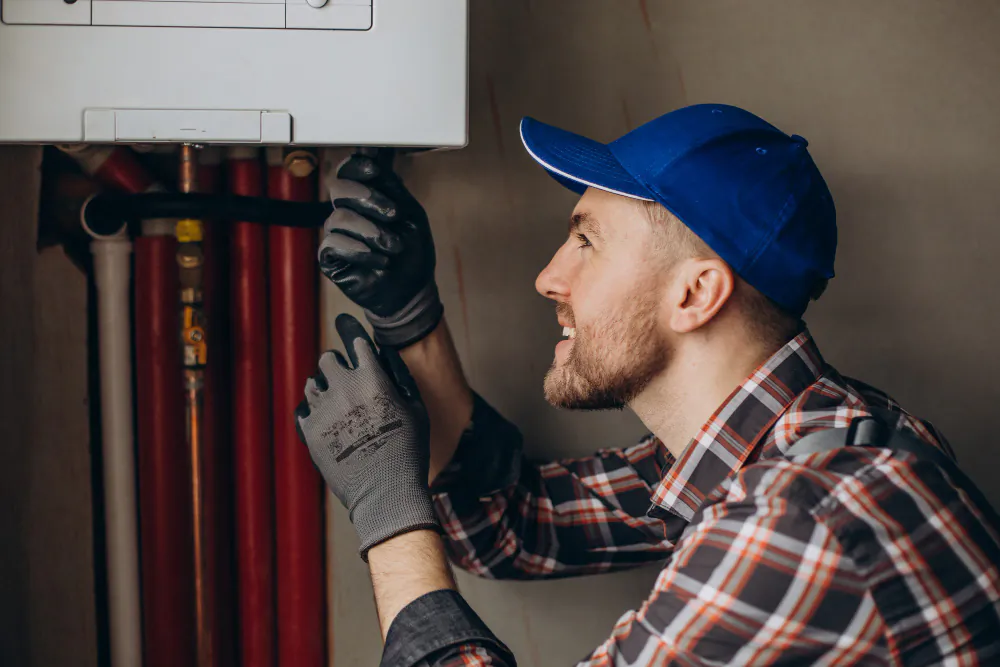Table of Contents
Introduction
A well-functioning heater is essential for keeping your home comfortable during chilly weather. But if you start hearing strange noises coming from your heating system, it’s a clear sign that something may not be right. Ignoring these sounds could lead to bigger, costlier issues down the road. This guide will explore the possible causes of those odd sounds, what each one might mean, and how you can address them to keep your home warm and cozy.
Common Types of Heater Noises and Their Causes
- Banging or Popping Sounds
- Cause: If you hear loud bangs or popping noises when your heater turns on, it might be due to expanding and contracting metal parts inside the unit, especially in forced-air systems. This could also indicate a dirty burner. When burners accumulate dirt or debris, it can cause delayed ignition—resulting in a mini explosion that creates a banging sound.
- Solution: This situation calls for a thorough cleaning of the burners. You might want to schedule an annual inspection and cleaning to prevent this issue in the future.
- Rattling
- Cause: Loose components within the heater could be the reason behind a rattling sound. These can include screws, bolts, or other parts that might have become unfastened over time. Additionally, the noise could be due to worn-out parts that need replacement.
- Solution: Tighten any loose parts you can locate. If the rattling persists, consult a heating professional to check for damaged components that may need to be replaced.
- Whistling or Squealing Sounds
- Cause: High-pitched sounds like whistling or squealing often come from an airflow restriction. If your heater’s filter is clogged, it can cause the unit to strain, producing these types of sounds. Another reason could be the motor bearing or fan belt wearing down.
- Solution: Start by changing or cleaning the air filter to improve airflow. If the sound continues, have a technician check the fan belt or motor bearing for signs of wear.
- Booming
- Cause: A booming noise, often loud and sudden, can occur in gas furnaces when there’s a delay in ignition. This delay happens when gas builds up and ignites all at once, causing a loud boom. This issue may signal that the burners are dirty or that there’s a malfunction in the ignition system.
- Solution: Schedule a professional cleaning for your furnace to remove any dirt or debris from the burners. Regular maintenance can help prevent this issue from reoccurring.
- Clanking or Clunking
- Cause: Clanking or clunking sounds usually suggest something more serious with the blower assembly or motor. Loose or broken parts within the blower could create this noise, or it might mean the motor is about to fail.
- Solution: If you’re hearing clanking noises, it’s best to turn off the heater and contact a professional to inspect the blower assembly and motor. Continuing to run the heater in this condition could result in further damage.
- Humming or Buzzing
- Cause: Humming or buzzing is typically associated with electrical issues in the heater. This noise may come from a failing capacitor or an issue within the transformer. Faulty wiring or loose electrical connections can also produce buzzing sounds.
- Solution: Electrical issues require professional attention. Turn off the heater and contact a certified HVAC technician to inspect and resolve the problem safely.
- Ticking
- Cause: A ticking sound, especially if heard right after the heater turns off, might be normal and caused by the metal parts contracting as they cool. However, if it’s louder than usual or continues for a while, it could indicate a problem with the igniter or a relay switch.
- Solution: Occasional ticking may not need any attention, but if it becomes frequent or louder, have a technician check the igniter or switches.
- Grinding or Scraping
- Cause: Grinding noises can be alarming and usually indicate a serious problem, often related to the blower wheel or motor bearings. If the blower wheel becomes loose or misaligned, it may scrape against other parts within the heater, producing a harsh grinding noise.
- Solution: Turn off your heater immediately if you hear grinding sounds. Continuing to run the heater could lead to significant damage. Contact an HVAC professional to inspect and repair any issues with the blower wheel or motor bearings.
- Thumping
- Cause: Thumping noises could mean the blower motor is out of balance or there’s a misalignment within the blower assembly. A buildup of dust or debris within the blower fan could also cause a thumping sound as it tries to spin.
- Solution: Cleaning the blower fan and realigning the components can often solve this problem. If it persists, an HVAC technician can assess the system for other issues.
Preventive Measures to Avoid Noisy Heaters
- Regular Maintenance: Scheduling yearly inspections with a certified HVAC professional can keep your heating system in optimal condition and catch potential issues before they lead to strange noises.
- Replace Air Filters Regularly: A clogged filter restricts airflow, causing various issues that lead to unusual sounds. Aim to replace or clean your filter every 1-3 months.
- Inspect Ductwork: Loose or poorly secured ductwork can amplify sounds from the heater. Ensuring ducts are properly sealed and fastened can reduce noise.
- Lubricate Moving Parts: Proper lubrication of blower motors and other moving parts reduces friction, which can cause strange noises and wear down components over time.
When to Call in a Professional
While some heater noises can be resolved with simple adjustments or regular maintenance, certain sounds signal a need for professional intervention. Loud banging, grinding, or buzzing noises often indicate problems with the motor, burners, or electrical components—all of which are best handled by a licensed technician. Ignoring these sounds can not only damage your heater but also pose safety risks, especially with gas or electrical systems.



0 Comments